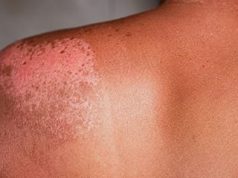The 2023 American Academy of Dermatology Annual Meeting
By Beth Gilbert HealthDay Reporter
The annual meeting of the American Academy of Dermatology was held from March 17 to 21 in New Orleans and attracted more than 12,000 participants from around the world, including clinicians, academicians, allied health professionals, and others interested in dermatology. The conference highlighted recent advances in the diagnosis and management of dermatological conditions.
During one presentation, Valerie Callender, M.D., of the Howard University College of Medicine in Washington, D.C., discussed several forms of alopecia that are common in women of color, particularly central centrifugal cicatricial alopecia (CCCA).
Callender explained how this type of alopecia is an inflammatory form of hair loss that causes destruction of the hair follicle and permanent scarring, which can negatively impact a patient’s quality of life and result in anxiety and depression. In the past, the etiology has focused on hair grooming practices, such as heat and chemicals to straighten the hair, but new data have revealed that genetics play a greater role in the development of CCCA. In addition, recently, several publications have noted associated comorbidities in CCCA patients.
“Therefore, early recognition, proper diagnosis, and aggressive treatment are critical,” Callender said. “In conclusion, there is a lot more that we need to know about this condition and further research is needed.”
In another presentation, Maria Wei, M.D., of the University of California in San Francisco, discussed the impact of wildfire air pollution on skin heath and strategies to minimize the negative effects of this specific type of pollution.
Wei provided insight into wildfire air pollution and its impact on air quality in the United States as well as the effects it has on skin health. Wei noted that wildfire smoke air pollution causes worsening of skin disorders, such as eczema and psoriasis, and can irritate normal skin, causing itching. In addition, air pollution from other sources (traffic and industry) has similar effects on patients with eczema around the world. Pediatric and adult patients are impacted differently by poor air quality, with an increase in visits seen for adults with psoriasis, but not for children.
“Clinicians should be aware that poor air quality can have rapidly occurring effects (on eczema and normal skin) as well as delayed effects on skin health (i.e., on psoriasis),” Wei said.
Elizabeth Kiracofe, M.D., of Airia Comprehensive Dermatology in Chicago, discussed treatment options for women living with eczema and psoriasis prior to and during pregnancy, as well as addressing birth control, fertility, hormone changes, and breastfeeding.
Kiracofe noted that women may be more negatively impacted by eczema and psoriasis, experiencing greater impacts on mental health, including depression, compared with their male counterparts. Kiracofe also noted that immunosuppressants used to treat eczema and psoriasis are not recommended during pregnancy, but first-line treatment options, including topical moisturizers, low- to mid-strength corticosteroids, and phototherapy, are safe prior to and during pregnancy. Furthermore, these treatments do not have negative impacts on birth control, fertility, time to conception, or breastfeeding.
“We are encouraging patients to understand that not all psoriasis and eczema medications are contraindicated in pregnancy. We want patients to be talking with their ob-gyns, as this is not a stop everything mode of action,” Kiracofe said. “For patients and their providers, whether primary care physicians or ob-gyns, there is also a danger to having high levels of uncontrolled chronic immune mediated inflammation going on in the body. By not treating a patient, we are also making a choice that has an impact as well, which is allowing immune-mediated inflammation to continue unchecked.”
AAD: Promising Results Seen for Bimekizumab in Hidradenitis Suppurativa
WEDNESDAY, March 29, 2023 (HealthDay News) — For patients with moderate-to-severe hidradenitis suppurativa, bimekizumab shows promise in phase 3 trials, according to research presented at the annual meeting of the American Academy of Dermatology, held from March 17 to 21 in New Orleans.
AAD: Long-Term Improvement Seen With Ruxolitinib in Vitiligo
TUESDAY, March 28, 2023 (HealthDay News) — For patients with nonsegmental vitiligo, continued improvement was seen during a long-term extension of ruxolitinib treatment, according to a study presented at the annual meeting of the American Academy of Dermatology, held from March 17 to 21 in New Orleans.
AAD: Risk for Skin Cancer Higher for Adults With Atopic Dermatitis
MONDAY, March 27, 2023 (HealthDay News) — Adults with atopic dermatitis have an increased risk for developing melanoma, basal cell carcinoma, and squamous cell carcinoma, with significantly higher risks seen for moderate-to-severe versus mild atopic dermatitis, according to a study presented at the annual meeting of the American Academy of Dermatology, held from March 17 to 21 in New Orleans.
AAD: Lebrikizumab Effective for Adults, Teens With Atopic Dermatitis
THURSDAY, March 16, 2023 (HealthDay News) — For adults and adolescents with moderate-to-severe atopic dermatitis, 16 weeks of lebrikizumab is effective, according to a study published online March 15 in the New England Journal of Medicine to coincide with the annual meeting of the American Academy of Dermatology, held from March 17 to 21 in New Orleans.
Copyright © 2023 HealthDay. All rights reserved.








